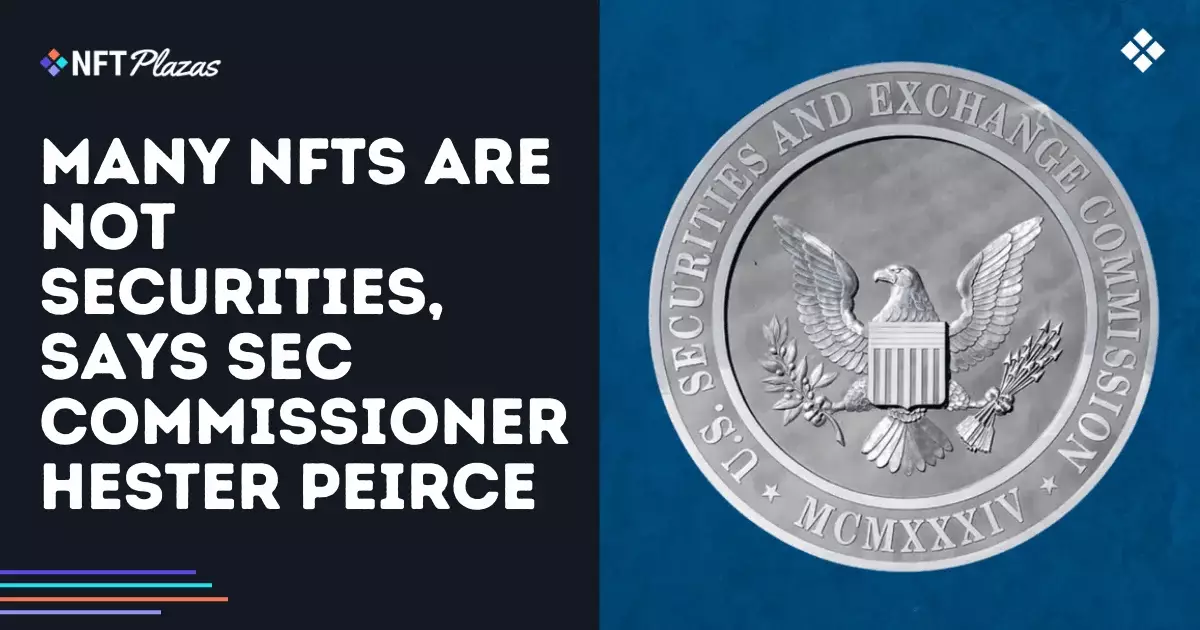In a world increasingly dominated by digital assets, the Securities and Exchange Commission (SEC) remains at a crossroads when dealing with the burgeoning Non-Fungible Token (NFT) market. Recently, SEC Commissioner Hester Peirce boldly declared that many NFTs likely do not fall into the securities category under U.S. law—a perspective that could be crucial for the future of the digital art and collectibles universe. However, this proclamation, while optimistic, does little to assuage the uncertainties plaguing creators and entrepreneurs invested in the NFT sector. The SEC’s approach has often been likened to a game of whack-a-mole—where enforcement actions appear sporadically and leave innovators scrambling for clarity.
The Trouble with Enforcement-Only Approaches
Peirce’s concerns about the SEC’s method—favoring enforcement over guidance—illustrate a significant hitch in the regulatory machine. With crypto projects expanding at an unprecedented pace, the lack of clear regulatory pathways stifles creativity and innovation, forcing talented individuals to tread carefully, lest they fall afoul of vague regulations. The notion that NFTs could be classified as securities hinges on a precarious notion: the idea that buyers expect profits from actions taken by a central entity. This interpretation seems increasingly outdated in a decentralized world that prides itself on community-driven projects and creator-led initiatives.
Safe Harbor: A Solution or a Band-Aid?
Amidst the chaos, Peirce has floated the concept of a “Safe Harbor” framework that offers crypto projects a respite from regulatory obligations for a set period—think three years to get the house in order. While this proposition sounds like a benevolent hand to struggling innovators, it also raises a flag of concern. Offering a temporary reprieve might inadvertently create a false sense of security, allowing projects to operate without the accountability expected in traditional markets. Could this approach merely promote a culture of complacency amongst digital asset creators?
The Need for Comprehensive Guidance
Moreover, Peirce’s remarks point to an urgent need for the SEC to provide clearer definitions and guidelines for NFTs. Issuing a blanket statement that many NFTs are not securities lacks depth if it does not delineate which specific activities could still be classified as such. The confusion this creates is detrimental, not just to creators but to the integrity of the digital marketplace overall. The landscape is so nuanced that continued reliance on existing regulations, without an adjustment for innovation, ultimately undermines the potential for growth and acceptance of these digital assets.
Legislative Action: The Way Forward
Peirce suggests that clarity may come from future SEC rulemaking or legislative changes—a sentiment all too familiar yet sorely needed. If lawmakers and regulators are genuinely committed to fostering innovation, then the time for static frameworks is over; adaptability must become the bedrock of regulatory philosophy. Understanding the dynamics of digital assets requires a complete departure from conventional theories that were never intended to encompass such rapid evolution. The emerging narrative around NFTs calls for progressive dialogue and collaboration between industry players and regulatory authorities, paving the way for an ecosystem where creativity and compliance can coexist.
Only then can we hope to see a harmonious relationship between regulators and the innovative minds that are reshaping our economic landscape.


Leave a Reply